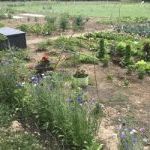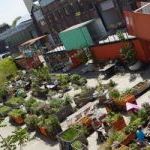Edible City Cologne
In this project, edible plants are being grown and taken care of in the urban environment of Cologne for animals and humans to eat and enjoy. While the dietary council of Cologne came up with this idea, all of the cities citizens, including students and teachers are invited to participate. A stronger connection between citizens leads to a mutual learning from one another and has inspired many to grow their own vegetables and herbs on their balconies.
Website
Useful links
Sustainable Food Places in the UK
Country
Media
* TOP TIP *
'Investigate if there are any regional or national projects that you could join - many cities, regions or municipalities are working towards a greener future!'
How is the project linked to climate change and sustainability?
As big cities tend to be largely concrete and hard surfaces, the idea of re-connecting their citizens with nature and edible plants is a fantastic way to grow a new awareness for climate change and sustainability. The plants also attract birds and insects, whichhave been dramatically vanishing from cities. Furthermore, the growing of fresh and delicious vegetables grown in your garden can inspire residents to start buying from local farmers or organic supermarkets.
Who is involved?
The Cologne city council started this project and all citizens are welcome to volunteer. The idea of edible city originates in the UK and has spread worldwide to inspire cities such as Chicago, New York and Havanna.
How are the particpants involved?
There are multiple ways of participating, from a simple activity such as a citizen taking responsibilty to water a tree during hot summer days, to wider growing projects. There a many urban gardens and townsquares where volunteers can help either as a one-off activity or regular sessions. Schools have started their own garden projects on campus and are officially part of this project,too. Participatory agriculture is another great option - here citizens work on farms and support farmers financially and in return receive a supply of the locally grown food.
Key steps:
Step 1. Look for what is available in your area - there may be community food projects, urban growing or community supported agriculture schemes that you can join.
Step 2. Decide in which tasks your school would like to participate in and how much time you can commit. It can be a great way to meet new people and learn new skills.
Step 3. Get in touch with a project leader and start your activity. One can help gardening existing gardens and spaces or start new projects in your school grounds.
Step 4. Perhaps even set up your own group with the school community if you can't find anything else in your area.




